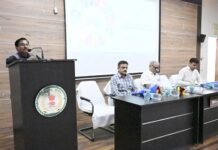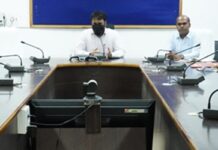She started her journey as a school teacher, went on to work in a state government college from where she joined Nagpur University and is now the Vice Chancellor of the SNDT Women’s University, a post she took up recently. She worked towards her interest in teaching, and fortified her knowledge with the right qualifications to do what she felt strongly for. That’s how Dr. Shashikala Wanjari, Vice Chancellor – SNDT Women’s University, has spent 32 fruitful years in the field of education.
Equipped with a master’s in biochemistry, Dr. Wanjari pursued her master’s in education, and also went on to complete her MA in English. But her foray into the field of education was not an immediate one. “When I was studying, I was aspiring to join medicine, but later I shifted to education,” she says. It was that experience which instilled in her the belief that time decides everything in life.
“I wanted to study medicine, but then could not take admission, so I decided to get into the field through biochemistry. In those days there was an option for biochemistry postgraduates to enter the field of medicine. But when I finished my master’s in biochemistry, that option was discontinued, so I had to rethink my career,” Dr. Wanjari says. The move then happened towards education, and she passed the qualifying SET apart from pursuing her further degrees. For enhancing her knowledge, she also enrolled for and completed her PhD. “I come from a middle class family, and I have an extremely supportive husband who has encouraged me to reach this position,” she says.
That’s what leads us to talk of utilising time fruitfully, even after a hard days of work. Dr. Wanjari says she believes in the spirit of togetherness. “Also, whenever the circumstances arise, we have to have faith in ourselves. Circumstances may imbalance us, par khud pe wishwas hona chahiye,” she reiterates, saying that then there will be no need to fear anything.
Personally, she reads a lot, especially books on self development. She holds out a book she is currently reading, based on the Bhagwad Gita. “This is a book which provides a source to resolve all conflicts. It is also my experience that meditation helps a lot in calming oneself down,” Dr. Wanjari advises. She says that even for her students, she tells them not only to meditate but to surround themselves with positive thoughts and suitable peers. “Students should keep company with friends who are positive thinkers. If the thought processes and attitude in their friend circle is not
good, then nothing concrete can come out of it.
Students need to have friends who are reliable and with whom they can talk and discuss anything under the sun,” she says. In this way, long lasting relationships can be built, and students will have these friends for life. She also feels that parents need to support their children in every way, and a lot more than that they doing now.
“I feel that parents are the life-long teachers for their children. They are there ever since birth and they are the first teachers a child ever has. I feel that even after the children grow up and are in college, parents should be alert as to what is going on with them vis-a-vis college and society,” Dr. Wanjari talks about parents, offering a little advice. She feels that parents should not limit themselves in terms of their responsibilities by simply admitting them into a good college and paying up the fees. “Parents should look out for their children continuously, that they are on the
right path, and assist the children whenever needed, but at the same time give them freedom.”
At the same time, the educationist feels that students also have certain responsibilities that they need to handle carefully. “I want to say that study at the time of studying, whatever your subjects and specialisations. Until the age of 21 or 23 years, you have to learn, and apply your mind so that you can use that learning for practical aspects of life. Your goal should not be simply to earn money, but to make use of what you have learnt in class, and apply that in your field. The money will follow automatically if you learn well and use the learning to advance yourself. If the teachers are committed to you, and your parents form a strong support system for you, then there is nothing that can stop you from achieving what you want.”
Despite her positivity, I remind her that the students still have to be part of the education system, which is not always conducive to practically achieve everything the mind think of in theory. “No, but the system is witnessing lots of changes. I am very hopeful that with the correct education, the students will be able to find appropriate career options and consequently, suitable jobs. That said, I feel that students should be able to stand on their own two feet. That’s why if they pursue education only for the sake of earning a degree, then the education will not serve its purpose,” she says.
Dr. Wanjari feels that apart from developing sound knowledge and thought processes, skill development is also necessary for the students. According to her, to empower the youth, they need to be brought up to a certain level with their skills, including behavioural and communication skills. To survive in any field, and even to go a long way in life, she believes that these are the most essential skills that a student should develop, otherwise education will border on the redundant side.
Apart from skills, the most important and non negotiable aspect of life, according to Dr. Wanjari, is paying attention to values. “I would like to tell the students that never go on copying or imitating anyone or anything for any purpose.
There is no point of copying without understanding. You should know your goal and then figure out the process of achieving that goal,” she says. She says that values are not a tonic that can simple be had twice a day to make an automatic difference in one’s life. They not only need to be learnt, inculcated and understood, but also implemented on a daily basis. She feels that a lot of this can be picked up by the students by going college and learning from their teachers and peers, and gradually imbibing in their personalities.















